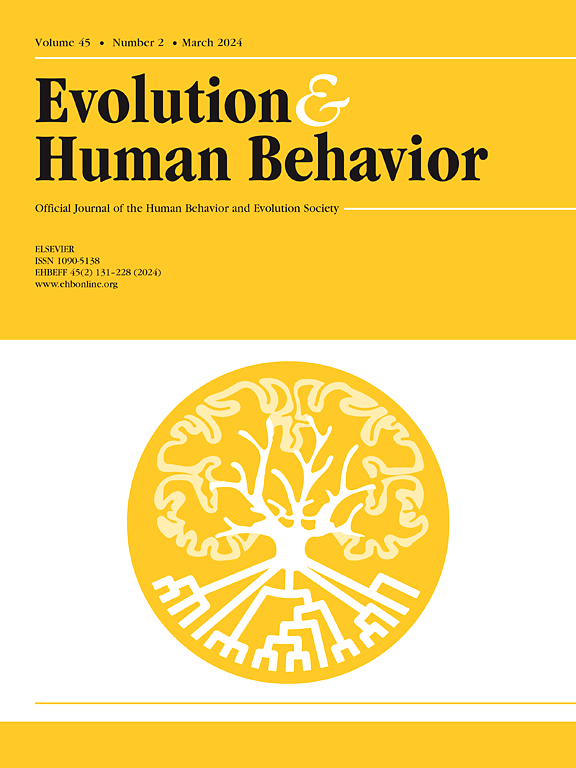Headmen, shamans, and mothers: Natural and sexual selection for computational services
IF 3.2
1区 心理学
Q1 BEHAVIORAL SCIENCES
引用次数: 0
Abstract
Computer engineers face a dilemma. They must build systems with sufficient resources to solve the most complex problems the systems are expected to solve, but the systems will only need to solve such problems intermittently, resulting in inefficient use of expensive computational resources. This dilemma is commonly resolved with timesharing, networking, multitasking, and other technologies that enable computational resources to be shared with multiple users. The human brain, which evolved to acquire, store, and process information to make beneficial decisions in situations that were periodically complex, is likewise energetically expensive to build and maintain yet plausibly has idle capacity much of the time. We propose that humans evolved to use advantages in information or computational resources to provide computational services to others via a language-based “network” in exchange for payments of various sorts that helped subsidize the energetic costs of the brain. Specifically, we argue that with the Pleistocene transition of Homo to a niche in open habitats with a more meat-based diet, four major selection pressures for knowledge specialists began to act on the human lineage: (1) the need to resolve conflicts and maintain cooperation in larger multilevel societies, which lead to the rise of knowledge-based leaders as decision-making and conflict resolution specialists who were “paid” with increased mating success or resources; (2) the need for greater defense against zoonotic pathogens, which lead to the rise of shamans as medical knowledge specialists, who were “paid” with increased mating success or resources; (3) the greater complexity of mothering with shorter interbirth intervals and longer periods of juvenile dependency, which led to mothers as both decision-making and medical specialists, who were “paid” with increased inclusive fitness; and (4) the need to make more efficient use of an increasingly large and energetically expensive brain.
首领、萨满和母亲:计算服务的自然和性选择
计算机工程师面临两难境地。他们必须构建具有足够资源的系统来解决系统期望解决的最复杂的问题,但是系统只需要间歇性地解决这些问题,从而导致昂贵的计算资源的低效使用。这种困境通常可以通过分时、联网、多任务处理和其他技术来解决,这些技术可以使计算资源与多个用户共享。人类的大脑进化到获取、存储和处理信息,以便在周期性复杂的情况下做出有益的决定,同样,构建和维护大脑在能量上也很昂贵,但似乎大部分时间都有闲置的能力。我们认为,人类进化到利用信息或计算资源方面的优势,通过基于语言的“网络”为他人提供计算服务,以换取各种形式的支付,这些支付有助于补贴大脑的能量成本。具体来说,我们认为,随着更新世人类向以肉类为主的开放生境过渡,知识专家面临的四大选择压力开始对人类谱系产生影响:(1)在更大的多层次社会中解决冲突和保持合作的需要,这导致了知识型领导者作为决策和解决冲突专家的兴起,他们的“报酬”是增加交配成功率或资源;(2)加强对人畜共患病病原体的防御需求,导致萨满作为医学知识专家的兴起,他们的“报酬”是增加交配成功率或资源;(3)母亲养育的复杂性越大,间隔期越短,子女抚养期越长,这导致母亲既是决策专家,也是医疗专家,其“报酬”随包容性适应度的增加而增加;(4)需要更有效地利用日益庞大和能量昂贵的大脑。
本文章由计算机程序翻译,如有差异,请以英文原文为准。
求助全文
约1分钟内获得全文
求助全文
来源期刊

Evolution and Human Behavior
生物-行为科学
CiteScore
8.30
自引率
9.80%
发文量
62
审稿时长
82 days
期刊介绍:
Evolution and Human Behavior is an interdisciplinary journal, presenting research reports and theory in which evolutionary perspectives are brought to bear on the study of human behavior. It is primarily a scientific journal, but submissions from scholars in the humanities are also encouraged. Papers reporting on theoretical and empirical work on other species will be welcome if their relevance to the human animal is apparent.
 求助内容:
求助内容: 应助结果提醒方式:
应助结果提醒方式:


